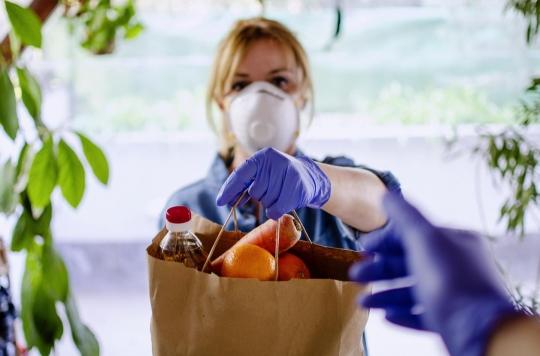Since the start of the health crisis, associations have noted a considerable increase in food aid needs. According to the Red Cross and Secours Catholique, the situation should remain the same in the coming months, “even deteriorating”.

On the surface, France seems to be coming back to life. However, the consequences of the health crisis we are going through have a heavy impact on food insecurity. For the months of April, May and June, the French Federation of Food Banks sees a 20 to 25% increase in the demand for help, “with disparities according to the territories”as Marine Riaudel, the association’s communications and partnerships manager, told us.
For its part, Secours Catholique had to order 5 million euros in service vouchers, which are similar to restaurant tickets, to cover a distribution from mid-March to the end of the summer. “There were real needs within the local branches”, assures Marie Drique, project manager “dignified access to food for the association”. Another major player in the voluntary sector, the Red Cross notes, an increase of nearly 45% in needs in emergency food aid since the start of the crisis.
“The crisis has reinforced the vulnerabilities of a public that was not precarious”
In particular: the entry of a new public into food aid structures due to the drop in income linked to confinement. At the level of the Red Cross, the latter are more than 90% to observe an increase in the number of unemployed (+ 60%), temporary workers or poor workers (+ 50%), retirees (+ 35%), people in a situation of great exclusion (+ 34%), students (+ 20%), or self-employed workers and traders (+ 19%).
“The crisis only reinforced the vulnerabilities of a public that was not precarious”, explains Valérie Bettinger, head of the Material and Financial Aid Department of the Red Cross. Same story on the side of Secours Catholique. “The diversification of situations in need partly explains the increase in demand for food aid”says Marie Drique.
The project manager partially attributes the arrival of these new audiences to the closure of collective catering during confinement, such as canteens for children. “To this is added that of the markets, because a certain number of people could glean and obtain reduced prices at the end of the morningshe believes. In addition, there has been a real increase in food costs, especially for fruits and vegetables”.
Rethinking the entire organization of associative structures
On the association side, it was necessary to rethink the entire organization of the structures to ensure food aid. “When the confinement was announced, we first had to stop activities to ensure the protection of our volunteers and the people we support, since they may be at risk”, explains Marie Drique. A break time which allowed the implementation of rules and arrangements to respect barrier gestures.
“We have developed the delivery of service vouchers to the doorstep of the people we support to avoid gatherings, with discussions from afar and calls upstream and downstream”, says the project manager. A system allowing people to help each other to do their shopping has also been launched, as well as the possibility of depositing service vouchers in the mailbox. “It led us to rethink our means of providing support, of maintaining social ties at a distance, in addition to food aid”, she notes. A way to replace the convivial activities on food traditionally set up by Secours Catholique, such as shared meals and cooking workshops.
An increase in the number of new association partners
The Red Cross also had to operate “a whole reorganization, in a very short time”. Adaptation of premises, multiplication of raids – which usually do not carry food aid – constitution of baskets… “Normally, the public is brought to our food centers by other associations or social workersexplains Valérie Bettinger. In the context of the crisis, emphasis has been placed on self-service and social grocery stores, receiving people by appointment to avoid too many people. We were also lucky enough to be able to distribute outside.”.
On the side of the French Federation of Food Banks, there is an increase in the number of associative partners, in response to the increase in the number of beneficiaries. “Throughout the duration of the confinement, the Food Banks faced the closure of partner associations due to a lack of volunteers or because of difficulties in the management of the confinement.reports Marine Riaudel. At the same time, we have seen an increase in the number of new association partners”. Between associations and municipal social action centers (CCAS), the French Federation of Food Banks had 347 new partners at the end of April.
“At the moment, the whole challenge is to confirm this commitment”
With the cessation of many volunteers aged over 70, and therefore fragile in the face of Covid-19, the Red Cross had to urgently reorganize its teams and welcome new volunteers. “We had a lot of requests: at the moment, the whole issue is to confirm this commitment because it was about people who were not working and wanted to be useful during confinement”emphasizes Valérie Bettinger.
A particularly important problem during the summer period. “Demand is not going to decline and, with the summer, associations generally operate with reduced staff”, continues the head of the Material and Financial Aid Unit. She mentions in particular the difficulties presented by the period for students, who usually take advantage of the summer to work, as well as the weakening of temporary workers. “Their missions will not resume immediately”she regrets.
“We wonder about the situation, which will remain the same, even deteriorate”
More broadly, it is the long-term effects of the economic crisis that are feared by associations. “We wonder about the situation, which will remain the same as that during confinement, or even deteriorate, if there continues to be a loss of incomedreads Marie Drique. With restricted budgets, the adjustment variable is food: we therefore expect to remain at high demand. We expect a wave of poverty”.
The concern is palpable. “This crisis testifies to the fragility and potential precariousness. When you have just-in-time income and you don’t work for three months, the payment of rents is impacted. Resolving the delays will not happen overnight on the next daybelieves Valérie Bettinger. We don’t expect an immediate improvement and, unfortunately, we have the opposite signals.”.
“We are in a structural situation; we need answers that are too”
To deal with the situation, the Red Cross, the Restos du Coeur, the Secours Populaire, and the French Federation of Food Banks, launched on June 17 a appeal to European institutions in order to increase the means dedicated to food aid. Specifically, the Red Cross “calls for the commitment of citizens and suggests that the public authorities participate in the construction of a social component in the recovery plan”.
In addition, Secours Catholique is asking for an increase in social minima so that everyone can have access to basic rights and, thus, to feed themselves. “This is one of the answers. At the level of public policies to fight against food insecurity, we must not remain on the palliativebelieves Marie Drique. We are in a structural situation; we need answers that are too”. Objective: to allow everyone independent access to food.
.

















